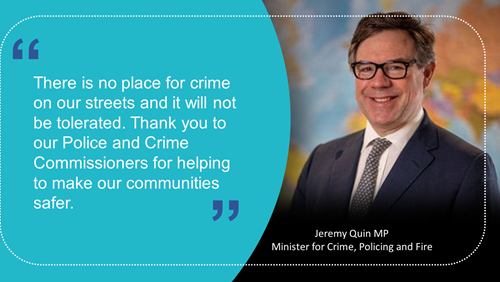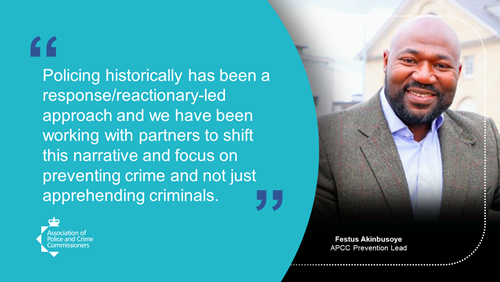In 2022, we marked ten years since the first democratic election of Police and Crime Commissioners (PCCs). Since then, they have been working hard to give the public a stronger voice in policing and criminal justice; keeping their communities safe and working collaboratively to protect victims, and prevent and reduce crime and reoffending.
We highlighted particular areas of work that demonstrated how PCCs are making a real difference. These included:
- Introducing a new focus on environment and sustainability
- Helping to end violence against women and girls
- Driving forward improvements to local criminal justice services and restoring public confidence and trust in policing
- Preventing crime and reducing re-offending
- Tackling anti-social behaviour and addressing drug and alcohol abuse
- Addressing race disparity and disproportionality within policing
Themes
The College of Policing has identified climate change as one of the ten most significant challenges for policing over the next ten years and , in support of this, the APCC launched a new portfolio to provide national leadership and a focus on this critical issue. In November 2021, in partnership with the National Police Chiefs Council and Bluelight Commercial, we launched a landmark decarbonisation programme, and PCCs are now setting priorities linked to the environment and sustainability in their police and crime plans.
Violence against women and girls has been brought into sharp focus by recent tragic and high profile cases, but these are not isolated incidents and this is not a new challenge. PCCs recognise that a whole-system approach is needed which draws together partners from across the board to effect change. They are driving positive change through high-quality commissioned services that focus on prevention, challenging offending behaviour and delivering vital victim and survivor support services.
As local leaders, PCCs bring criminal justice partners together to reduce crime and reoffending and place victims’ needs at the heart of the criminal justice system. We welcome the recommendations to develop their role in the criminal justice system as set out by the Home Secretary in Part Two of the Police and Crime Commissioner’s Review. This puts PCC-chaired Local Criminal Justice Boards on a statutory footing, and recognises the critical role that these boards play in mobilising agencies to work together more effectively. PCCs now play a more integral role in improving the criminal justice journey for victims and witnesses.
The Victims In Focus report highlights the innovative work that PCCs have implemented to develop practices which support victims, demonstrating their commitment and collaborative approach to tackling some of the most harmful and traumatic crimes.
Preventing crime and anti-social behaviour means fewer victims, reduced demand on courts and prisons and increased feelings of safety. PCCs have developed a ‘whole-system approach’ to preventing crime by working with partners across not just policing, but health, social care, local authorities and charities. We welcomed the government’s Safer Streets Fund which allows PCCs to work with local partners in areas that are disproportionately affected by neighbourhood crime, investing in preventative approaches to make communities safer.


Half of all homicides and acquisitive crimes are drug related, and a large volume of crime and anti-social behaviour is linked to misuse of alcohol. There is also growing awareness of the links between problem gambling and crime. Working with local and national partners, PCCs have a critical role to play in tackling the substance misuse and addiction that drive so much crime and anti-social behaviour in our communities. PCCs are working closely with local authority partners and community groups to tackle anti-social behaviour (ASB), but they want to do more and go further. That is why ASB features so prominently in their police and crime plans.
“Police and Crime Commissioners (PCCs) are elected to act as the public’s voice in policing, and what we hear from our local communities is that neighbourhood crime and anti-social behaviour really matters.
We know from the victims and community groups that we speak to, that these crimes destroy lives, and it is imperative that we work together at a local and national level to tackle them.
Tackling anti-social behaviour is a key priority highlighted in all police and crime plans in England and Wales. As the voice of the public, PCCs will continue to fund preventative projects and initiatives and work with partners to support vulnerable young people.”
APCC Local Policing Leads, Jeff Cuthbert and Steve Turner
The APCC developed the Equality Framework. Updated annually, this practical guide supports PCCs in:
- Meeting their legal equality duties
- Improving community engagement ensure fair policing practices
- Promoting diversity and inclusion within policing and criminal justice
“The Equality Framework is a positive step in advancing equality and promoting good relations between the police and communities at a time when it’s needed more than ever. The Framework has the potential to help PCCs, elected mayors and their deputies, and other police governance bodies to hold chief constables to account, and improve public trust that the police and wider criminal justice agencies are working to protect and serve all communities”
Jackie Killen, Director of Regulation, Equality and Human Rights Commission
PCCs have a critical role to play in tackling the substance misuse and addiction that can drive so much crime and anti-social behaviour in our communities.
Half of homicides and half of acquisitive crimes are drug related, and a large volume of crime and anti-social behaviour is linked to misuse of alcohol. There is also growing awareness of the links between problem gambling and crime. PCCs have a critical role to play in tackling the substance misuse and addiction that can drive so much crime and anti-social behaviour in our communities, working with their local and national partners.
“The use of illegal drugs is fuelling an epidemic of violence and criminality, destroying people’s lives and wreaking havoc in our communities. Statistics show that around 1 in 11 adults aged 16-59 have taken a drug in the last year and over half of all homicides and acquisitive crimes are believed to be drugs related. The figures are frightening, and the picture is bleak.”
APCC Joint Addictions & Substance Misuse Leads, Joy Allen and David Sidwick
The Victims In Focus report highlights the innovative work that PCCs have implemented to develop practices which support victims, demonstrating their commitment and collaborative approach to tackling some of the most harmful and traumatic crimes.